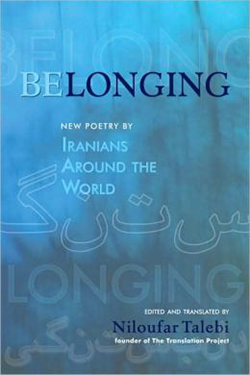Belonging: New Poetry by Iranians Around the World
edited and translated by Niloufar Talebi
reviewed by Elizabeth T. Gray Jr.
Soon after the Revolution of 1979, it became clear to every artist and writer in Iran that Khomeini’s Islamic Republic would prove more hostile to their work (and their lives) than the Shah’s empire. While some poets chose to remain in Iran, adapting the form and content of their work to intense and shifting standards of censorship, many of them fled—to Australia, Canada, France, Germany, Scandinavia, Britain, the United States, and elsewhere. In 2002, Niloufar Talebi, herself a member of the “seventy-niner” generation that left Iran after the Revolution, sought out the poets of this diaspora and began to collect and translate their work. Talebi’s Belonging offers to English and Persian readers a bilingual sampling of work from nineteen of these Iranian poets.
The poets included fall into three groups. The first are those who were well established and widely published in Iran (and abroad) at the time of the 1979 Revolution. These include such well known poets as Nader Naderpour (currently living in the U.S.), Yadollah Roya’i (France), and Esma’il Kho’I (U.K.). The second group, born between 1945 and 1960, hit their stride before and during the Revolution and matured outside Iran. Majid Naficy (U.S.) and Jamshid Moshkani (Sweden) are included among these poets. The last group came of age during the Revolution but has grown up outside Iran and includes Shahrouz Rashid (Germany) and Granaz Moussavi (Australia). A brief introduction to each poet’s work includes biographical information, a description of the scope and focus of his or her work, and, in some cases, context for specific poems.
The poems speak of lost places and missing people; of the fear and freedom that come with new surroundings; of love, sex, and passion; of prison and protest; of the commonplace and the universal; and of subjects classical, political, and taboo. Here is “Ghosts,” a delicate blend of pragmatism and loss, by Amir-Hossein Afrasiabi (the Netherlands):
You’ve done well
changing the table around,
not because it was too big
for our little kitchen
or that
two of the four chairs were always
empty
but because now
you’ve fixed it so this little table
has only room
for two
And here is the middle section of “The Dead Dear One” by Saghi Ghahraman (Canada), whose terse depiction of women’s place in traditional Iranian culture is a frightening take on the traditional Iranian “mother poem”:
Cold floats in cold
Little by little
The dead dear one turns blue
We pull the sheet up a little
We pull the dress up a little
We spread her legs and enter her
We get up
Straighten the dress up
Straighten the sheet up
We sit
The dead dear one slowly swells
The sheet rises a little, a little higher
We spread her legs
We pull our children out
We straighten her legs
We pull the sheet down
The dead dear one shivers of cold
The children shiver of cold
We drink tea
In form and imagery these poems often allude to works of Persian classical literature, but they are also the heirs of Rimbaud, Lorca, Dante, Shakespeare, and the literatures of adopted countries. Most are in sh’er-i now, the free verse form pioneered by NimaYushij in the 1930s, but some are more experimental. Here is “Untitled 19” by Naanaam or “Anonymous” (Canada):
Berlin, 2004—I wanted to return after two weeks;
I stayed ten months.
Bratislava, 1997—I wanted to return after 6 months;
I stayed 6 years.
The World, 1964—Upon arriving, I immediately wanted to return. It’s been 40
years.
There ain’t no master plan! In this house, the house itself’s the landlord. You wanna sit on the bed, you fall into the pool. You get outta the pool, you hit the ceiling; you hit the ceiling, you fall back into the bed. You get up only to see a person standin’ buck-naked in front o’ you. You recognize the nitty-gritty of the body, but you can’t tell if it’s a man or a woman. It gives you a ticket.
For another 40 years!
Talebi’s translation process included thorough review and collaboration with the poets themselves, as well as with American poets Daniel O’Connell and Zack Rogow. While one can always find phrases with which to quibble, the translations are of consistently high quality—by which I mean that not only do the poems work in English, but they adhere closely to the originals in tone, content, and format. In her version of “Post-Cinderella,” by Granaz Moussavi (Australia), Talebi has deftly recreated the turns and repetitions of the original:
I have gone so far for you
that my foot does not fit in any lone shoe
but has to
so much has to have gone from me
to fit into you.
Talebi, a writer, editor, producer, and theater artist, directs the Translation Project, a non-profit organization whose mission is to bring contemporary Iranian literature to the public—Iranian and non-Iranian—through a variety of media. Belonging is a beautifully crafted component of this effort. An appendix offers a partial list of another 135 Iranian poets writing in sixteen countries, a trove of additional riches waiting to be found.
Published on June 20, 2013

